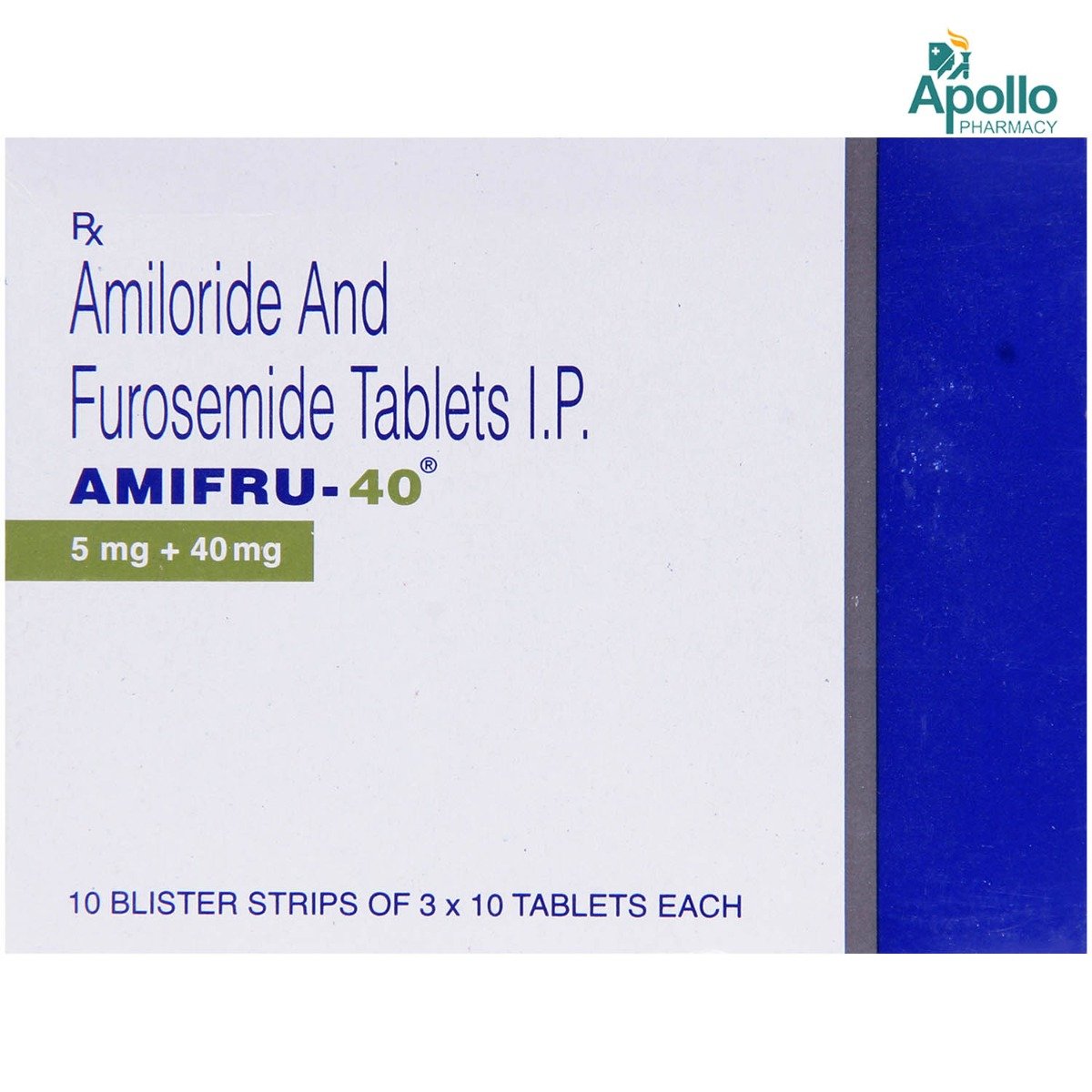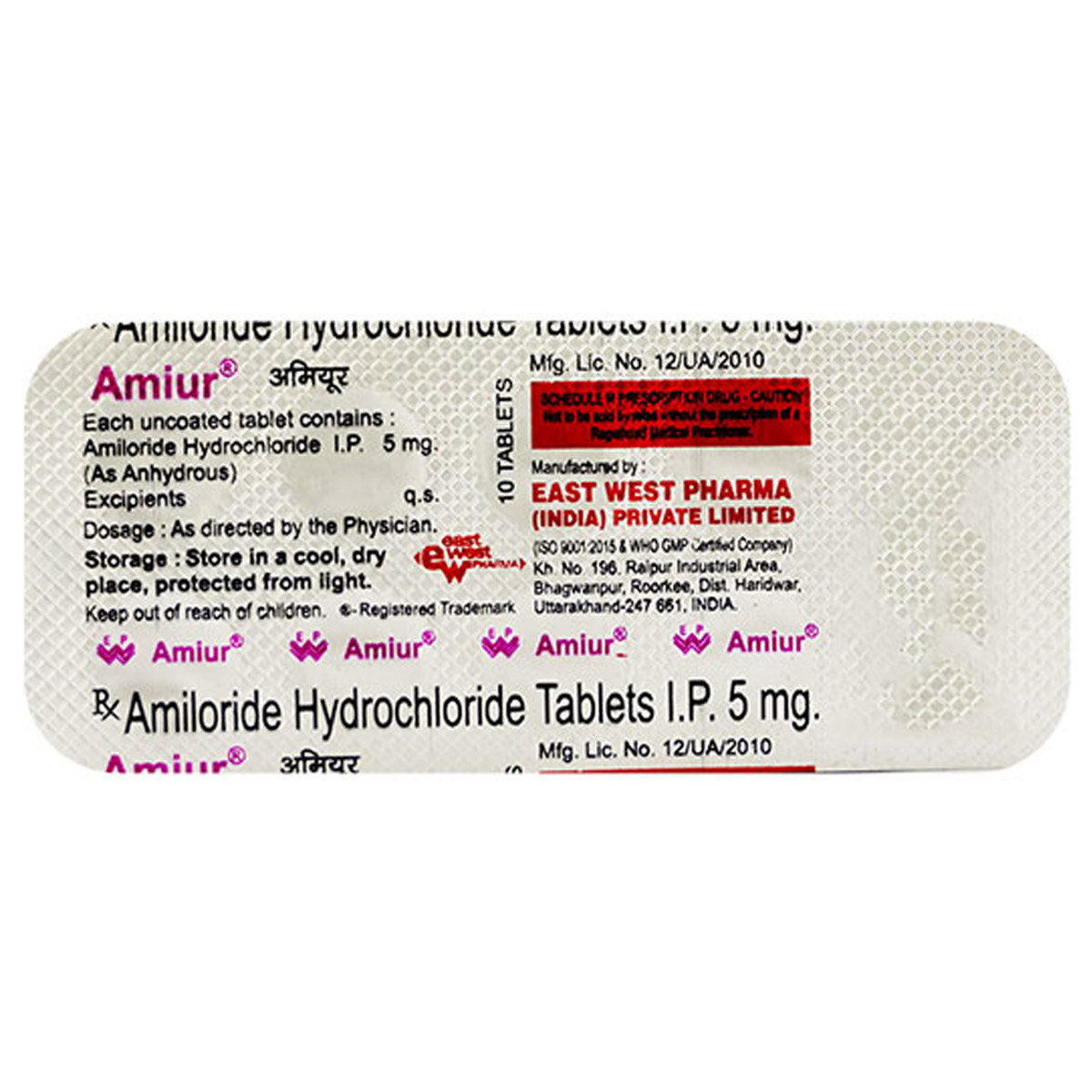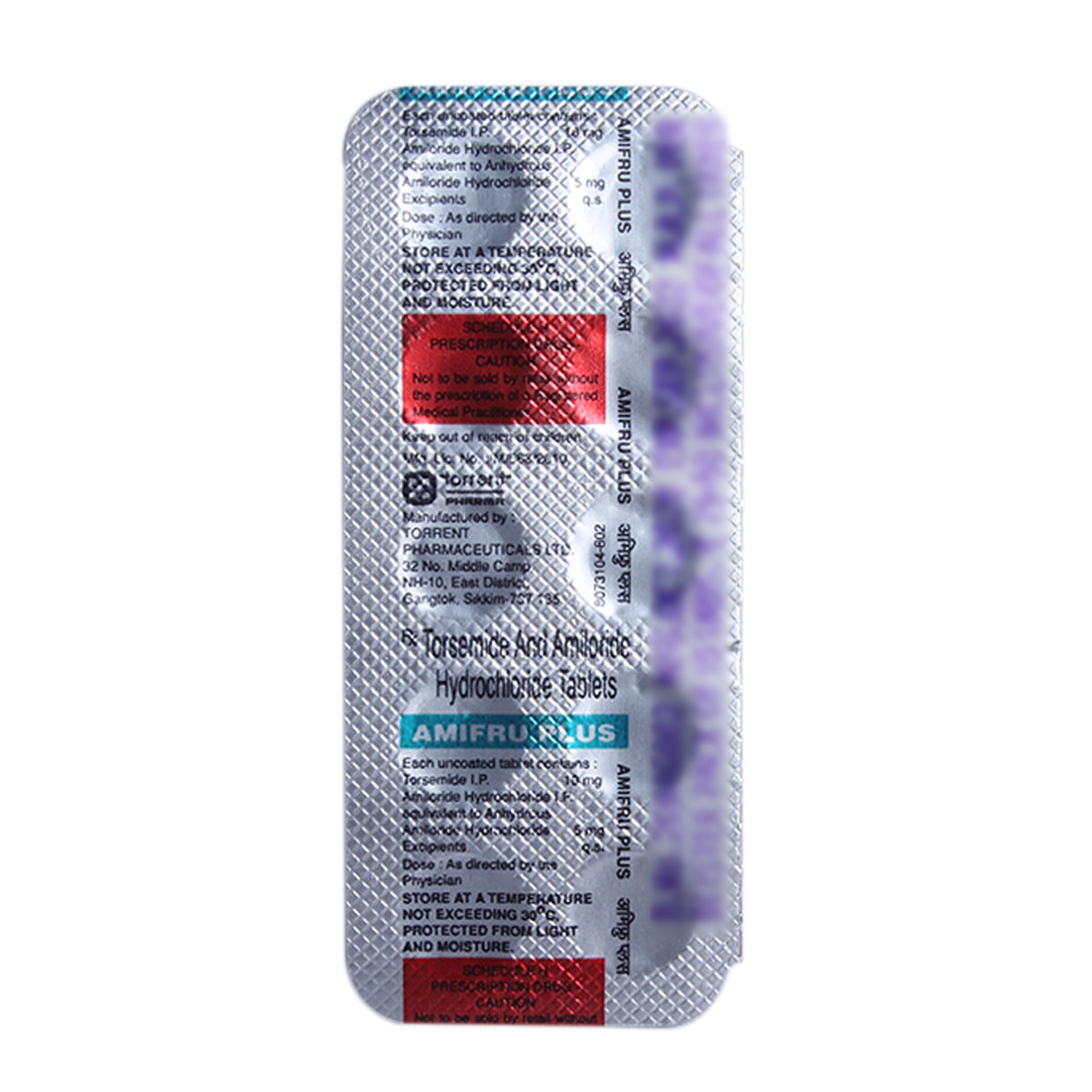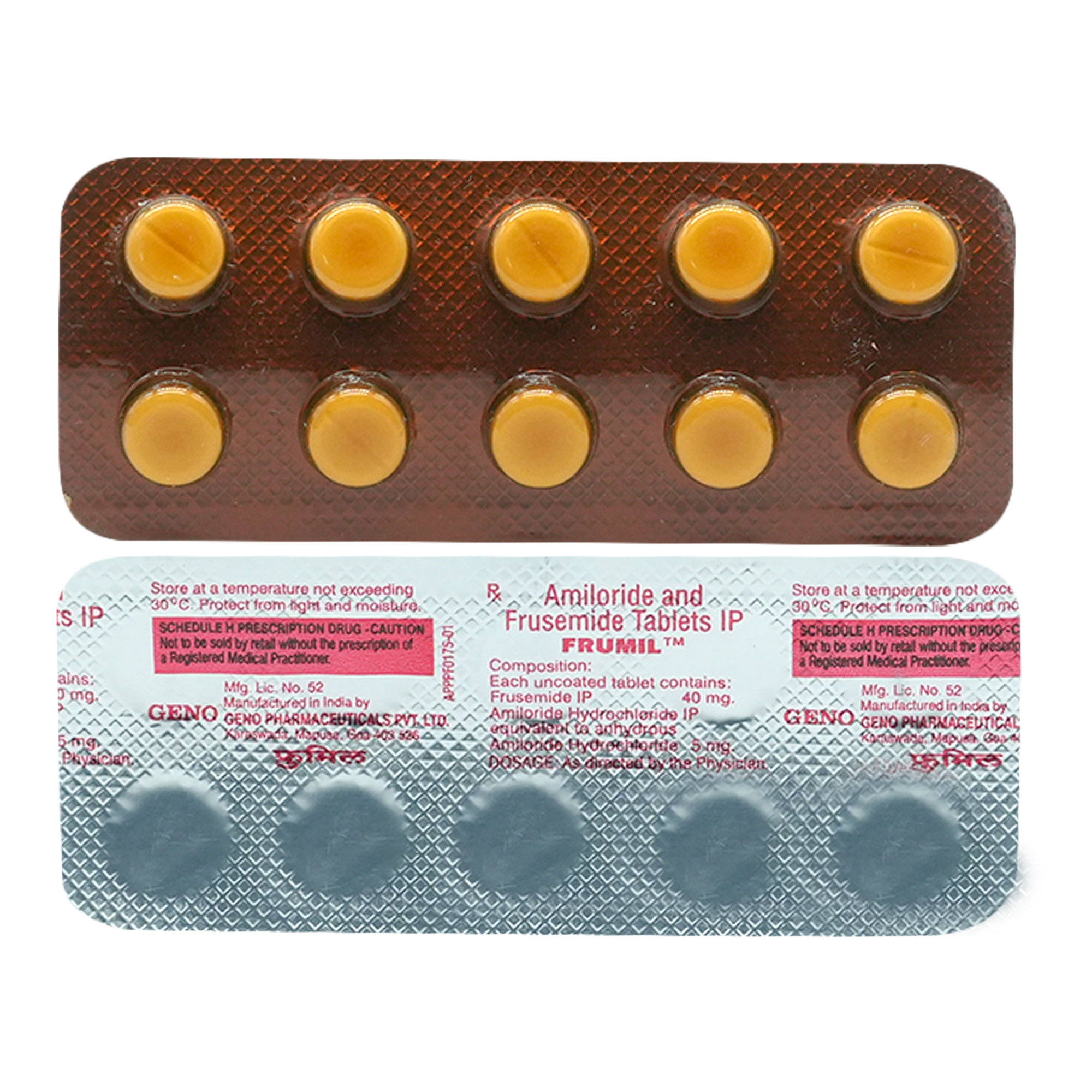Amiloride
About Amiloride
Amiloride belongs to the class of medicines known as 'diuretic drugs or water pills', used with other diuretics to treat hypertension (high blood pressure) and oedema (fluid overload). Hypertension is a medical condition in which the blood exerts high pressure (force exerted by circulating blood) against blood vessel's walls. Amiloride is used alone or in combination with other antidiuretic medicines for treating the condition.
Amiloride contains Amiloride, which belongs to the class of potassium-sparing diuretics. It works by blocking sodium-potassium exchange in the distal tubule of the nephron (functional unit of the kidney).
Amiloride may cause certain side effects like nausea, vomiting, diarrhoea, headache, glucose intolerance, weakness, muscle cramps, electrolyte imbalance, and increased uric acid levels in the blood. Most of these side effects of Amiloride do not require medical attention. Take Amiloride as prescribed by your doctor.
Amiloride should be avoided if you are allergic to it. Do not stop taking Amiloride without first consulting your doctor. Amiloride should not be taken in conditions like diabetes (high blood sugar level), high level of potassium in the blood and kidney impairment. Before taking Amiloride, inform your doctor if you have kidney or liver disease, heart problems, and/or diabetes. If you are pregnant and breastfeeding, consult your doctor before taking Amiloride.
Uses of Amiloride
Medicinal Benefits
Amiloride prevents the build-up of extra water in the body and treats hypertension (high blood pressure). This medicine contains Amiloride, which belongs to the class of potassium-sparing diuretics. It works by blocking sodium-potassium exchange in the distal tubule of the nephron (functional unit of the kidney). Amiloride works by acting on different parts of the kidney to remove extra fluid and certain electrolytes while maintaining the body's potassium balance. Amiloride clears the excess fluids in the body in the form of urine.
Directions for Use
- Amiloride should be taken with meals.
- It is usually taken once a day, or as prescribed by your doctor.
- Swallow it as a whole with a glass of water.
- Do not break, chew or crush Amiloride.
Storage
Side Effects of Amiloride
- Nausea
- Vomiting
- Diarrhoea
- Headache
- Glucose intolerance
- Weakness
- Muscle cramps
- Electrolyte imbalance
- Dizziness
- Abdominal pain
Medicines Containing this Salt
View AllDrug Warnings
Do not use Amiloride if you are allergic to Amiloride or any of its components. Amiloride should not be taken in conditions like diabetes (high blood sugar level), high level of potassium in the blood and kidney impairment patients. Before taking Amiloride, inform your doctor if you have kidney or liver disease, heart problems, and diabetes. This medicine may cause hyperkalemia, increased blood sugar levels, metabolic or respiratory acidosis in some patients. Hence, inform your doctor about all your medical and medication history prior to taking the medicine. Amiloride is not recommended for children as the safety and efficacy are not established. It is not recommended to drive after taking Amiloride as it may cause drowsiness and dizziness. It is unknown whether this medicine is given to pregnant and breastfeeding mothers. Hence, inform your doctor beforehand.
Drug Interactions
Drug-Drug Interactions: Amiloride may interact with antihypertensives (enalapril, ramipril, benazepril, valsartan, losartan), diabetic drugs (Insulin, chlorpropamide), anti-depression medicine (lithium), painkillers (ibuprofen, aspirin, morphine), antianxiety (phenobarbital, secobarbital), etc.
Drug-Food Interactions: Amiloride may interact or may have a decreased effect when used with alcohol.
Drug-Disease Interactions: Before using Amiloride, let your doctor know if you have low potassium levels, kidney disease, liver disease, and diabetes.
Drug-Drug Interactions Checker List:
Safety Advice

Alcohol
cautionAlcohol consumption may cause dizziness. Hence, avoid consumption of alcohol as it may worsen the side effects of Amiloride.

Pregnancy
cautionIf you are pregnant or planning pregnancy, inform your doctor before taking Amiloride. Your doctor may prescribe this medicine if the benefits outweigh the risks.

Breast Feeding
cautionIf you are breastfeeding, inform your doctor before taking Amiloride. Your doctor may prescribe this medicine if the benefits outweigh the risks.

Driving
cautionAmiloride may cause side effects such as dizziness or tiredness. Hence, avoid driving or operating machines until you are alert.

Liver
cautionIf you have a pre-existing or a history of liver disease, inform your doctor before taking Amiloride. Your doctor may adjust the dose of this medicine or prescribe a suitable alternative based on your condition.

Kidney
unsafeAmiloride is not recommended for use in patients with kidney impairment. Hence, if you have a pre-existing or a history of kidney disease, inform your doctor before taking Amiloride.

Children
unsafeAmiloride is not recommended for use in children as the efficacy and safety have not been established.
Habit Forming
Diet & Lifestyle Advise
- Keep your weight under control with a body mass index (BMI) between 19.5 and 24.9.
- Do regular physical activity or exercise for at least 150 minutes per week, or about 30 minutes most days of the week. Doing this can help you to lower your raised blood pressure by about 5 mm of Hg.
- Limit sodium chloride intake (table salt) in your daily diet to 2300 mg per day, or less than 1500 mg is ideal for most adults.
- If you are taking alcohol, use only one serving for women and two servings for men.
- Quit smoking to lower the risk of heart disease.
- Avoid chronic stress, as it can raise your blood pressure. Try to enjoy and spend time with your loved ones to cope with stress.
- Monitor your blood pressure daily, and if you notice any fluctuations frequently, please contact your doctor immediately.
- Try including heart-healthy omega-3 fatty acid-containing foods in your daily diet. You can also use low-fat cooking oils like olive oil, soybean oil, canola oil, and coconut oil to lower your elevated blood pressure.
Special Advise
- Your doctor may advise you to get a regular kidney function test, and blood examinations for potassium levels and other electrolytes while using Amiloride to rule out any renal impairment.
Patients Concern
Disease/Condition Glossary
Hypertension: It is a chronic condition when blood pressure is too high. Blood pressure is defined as the amount of blood pumped by the heart and the amount of resistance exerted by the arteries against the blood flow. If the heart pumps more blood, then arteries become narrower, and in turn, blood pressure becomes high. If blood pressure becomes uncontrolled, it may lead to serious heart diseases, including stroke and heart attack. Additionally, high blood pressure can also cause brain damage (stroke) and kidney failure. Ideal blood pressure should be between 90/60mmHg and 120/80mmHg. Some of the symptoms of hypertension include headache, nosebleeds, vomiting and chest pain.
Oedema: It is swelling caused by excess fluid trapped in the body's tissues. It can affect any part of the body, preferably more in the hands, arms, feet, ankles, and legs.
FAQs
Amiloride is used to treat Hypertension, Congestive Heart failure and Oedema.
Amiloride consists of Amiloride, which belongs to the class of potassium-sparing diuretics. It works by blocking sodium-potassium exchange in the distal tubule of the nephron (functional unit of the kidney).
Your doctor will examine the potassium levels in your blood regularly for high potassium levels. Make sure that you do not forget any future meetings with the doctor.
Amiloride can cause dizziness as one of its side effects. If you feel dizzy, try getting up slowly from a sitting or lying position. If your dizziness is severe or unmanageable, please seek medical advice.
Amiloride is a diuretic, specifically a potassium-sparing diuretic. It works by blocking sodium-potassium exchange in the kidneys, preventing excess water build up in the body, and treating hypertension (high blood pressure) by increasing urine production.
Amiloride usually starts to work within a few hours. However, the working efficacy of the Amiloride depends upon the individual severity of the condition, response to the medication and dose administering. Always follow your doctor's instructions for optimal results.
Amiloride is not commonly associated with erectile dysfunction (ED). But, the individual response towards Amiloride may vary. If you are experiencing erectile dysfunction (ED), please consult your doctor and discuss your issue.
Please don’t stop taking Amiloride. Follow your doctor's advice. Stopping without your doctor’s approval can lead to adverse side effects. The doctor will assess your condition and suggest you suitable course to have the best recovery. If you have any concerns about taking Amiloride please discuss with your doctor first.
It is beneficial only if you are having low potassium levels in your body. However, your doctor will monitor your potassium levels, as excessive potassium can be harmful. Ensure they stay within a safe range.
Amiloride can have an effect on blood sugar levels, particularly in people with diabetes. Amiloride may cause (diabetes) an increase in blood sugar levels. So diabetic people need to monitor their blood sugar levels closely while taking this medication.
After reassessing your health condition with Losartan, your doctor might have decided that a combination of Amiloride and Hydrochlorothiazide would be more effective for your treatment and recovery. Moreover, Hydrochlorothiazide (diuretic) works well with Amiloride to control blood pressure and manage your potassium levels more effectively. It's always best to discuss your treatment plan with your doctor to understand the specific reasons behind their prescription choices.
It’s essential to be cautious when taking aspirin and Amiloride. This combination should only be taken with a doctor's prescription. Regular checks on your blood pressure, kidney function, and potassium levels are necessary. Always follow your doctor's instructions to ensure safety.
Take the missed dose as soon as you remember it. However, if it is almost time for the next dose, skip the missed dose and continue your regular dosing schedule. Do not take a double dose to make up for a missed one.
The common side effects of Amiloride which may cause in some individuals include nausea, vomiting, diarrhoea, headache, glucose intolerance, weakness, muscle cramps, electrolyte imbalance, and increased uric acid levels in the blood. However, these symptoms vanish as your body adjusts to the medication. If these symptoms worsen, please consult a doctor for relief.






